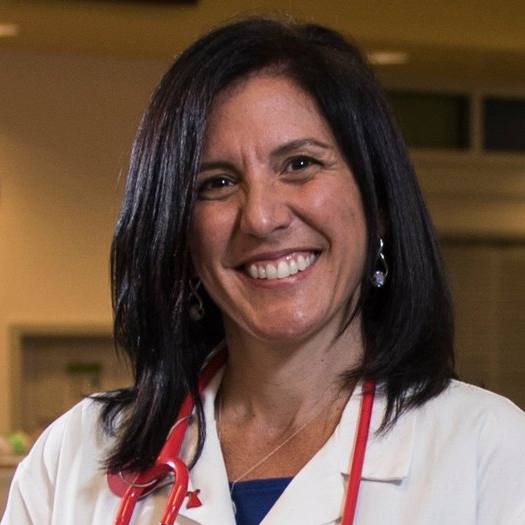
Winona's Story

Megan and Dennis of Leesburg, Virginia had tried for several years to have a child. After multiple rounds of in vitro fertilization, they were delighted to discover that they were pregnant with twins: a girl and a boy. “These were our last two embryos. For whatever reason, they both stuck. We were thrilled!” Megan said.
However, during a routine prenatal appointment at around 16 weeks, Megan and Dennis found out that their unborn daughter had a heart defect. The diagnosis was not a complete surprise. “With my husband and his brother already having congenital heart disease, I was getting care from a high-risk doctor,” Megan explained. As a child, Dennis had surgery at Children's National Hospital in Washington, D.C., and also received long-term treatment there for pulmonary atresia with ventricular septal defect, a congenital heart condition in which one of the four heart valves is missing. His brother was also treated at Children’s National for another congenital heart defect -- transposition of the great arteries. This serious defect impacts the flow of blood through the body because the major body vessels, the pulmonary artery and the aorta, are reversed.
Traveling to Washington, D.C., for Diagnosis

After receiving the news about their daughter, the couple scheduled an appointment with Mary Donofrio, M.D., medical director of the Children’s National Prenatal Cardiology Program, the program that provides diagnosis and comprehensive care for unborn children with heart conditions, at clinic locations in the region. Early on, doctors thought that Winnie might have the same heart condition as her father. However, Dr. Donofrio eventually diagnosed Winnie with truncus arteriosus, a similar and also serious congenital heart defect where the infant only has one major body artery, instead of the typical two. Children born with truncus arteriosus require a series of surgeries throughout their lives. The first surgery to repair this type of defect is most successful if completed during the baby’s first month of life. If left untreated, the condition can be fatal.
In consultation with Dr. Donofrio, Megan and Dennis decided to deliver their babies close to home at Reston Hospital Center in Virginia. Children’s National has an established regional partnership with the neonatal intensive care unit (NICU) at Reston, as well as with other hospitals throughout Virginia and Maryland. Because of this partnership, the couple knew that their daughter’s transfer to Children’s National for heart surgery after her birth would be safer and more seamless thanks to a dedicated neonatal care and transfer team.
Winona (Winnie) and her twin brother Easton were born at 35 weeks and 5 days on April 29, 2021.
Because of Winnie’s condition, she was immediately transferred to Children's National to prepare for her first surgery. While Dennis traveled to Washington, D.C., with Winnie, Megan stayed in Reston to recover and be with Easton. Because Winnie was born premature, her surgery was initially delayed for a few days to allow time for her to grow a little bigger. However, when she was about a week old, the doctors at Children’s National decided they couldn’t wait any longer. Yves d'Udekem, M.D., Ph.D., division chief of cardiac surgery and co-director of Children's National Heart Institute, performed the surgery, which involved creating a conduit to connect the right side of Winnie’s heart to her pulmonary artery. “At Children’s National we see a high volume of these complex cases, even in premature babies like Winnie. We knew that in order to achieve the best outcome for her, the time was right to perform the surgery,” Dr. d'Udekem said." She recovered from the surgery remarkably well despite her small size.”
On the Road to Recovery
While the surgery was a success, Winnie’s stay in the cardiac intensive care unit (CICU) at Children’s National turned out to be longer than anticipated because of her small weight. She developed blood clots in her vessels. “When we saw our 1-week-old Winnie suffer from complications after surgery, the CICU was there for us and continuously supported every need not only for Winnie but for our parental needs as well,” Megan said. After three months in the CICU, the medical staff at Children’s National was able to take Winnie off oxygen, disconnect her heater, remove her stitches and send her home, where her parents, twin brother and some new puppies eagerly awaited her arrival. “Being in the CICU was a scary journey for our sweet little preemie but it was the most reassuring feeling knowing she had the most loving and best medical team around,” Megan said.
Twins Reunited After Life-Saving Cardiac Surgery

Winnie’s family is beyond grateful that she is now at home. “She is doing great. Her heart function is wonderful,” Megan said. “She's happy and giggling, holding her head up.” Overall, her mother reports that she’s doing very well and will hopefully stop blood-thinning medications soon. Winnie’s next surgery will likely take place in early 2022 and will involve replacing the conduit so it’s a better fit for her growing heart.
The first few months of the twins’ lives have certainly been challenging. “It was hard being my first babies. Definitely. To have twins and then have to cope with Winnie’s condition on top of that felt overwhelming,” Megan said. She is so appreciative of the support they received at Children’s National. During her daughter’s stay at the hospital, Megan got to know Nora, one of the CICU nurses, very well. The two have stayed in touch and become good friends. “Honestly, the nurses at Children’s [National]…they were my saving grace. Without nurses like Nora, I would not be in the mental and emotional place where I am today,” Megan said.
“When I look back on it, we felt so cared for. And there are so many parents out there who are going through a similar experience,” Megan said. “I would say to them that you need a good, strong support system behind you as we experienced at Children’s [National]. That, combined with the knowledge that Winnie’s physicians are highly skilled in performing these types of surgeries, gave us the peace of mind we needed.”
Departments that Treated
- "˜Return to school' criteria vital for kids' concussion recovery
- "˜The Hot Zone,' a Vignette-Based Learning Platform Teaches Clinicians How to Spot and Treat Malaria
- "Be Brave and Shave" Raises $100,000+
- "Dancing After Dark" Raises $170,000+ for Kids
- "Four Stories of the Heart"
- "Garden Party" Honors Donors to Healing Garden


